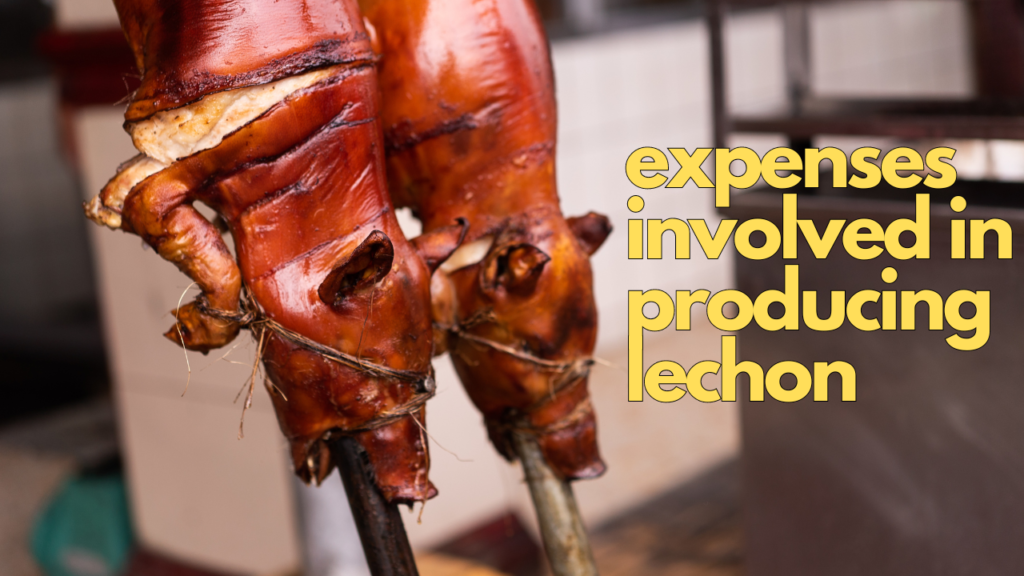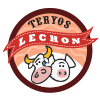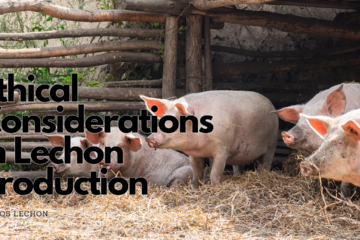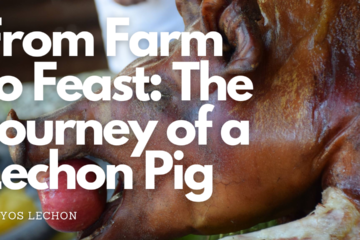Lechon, a roasted whole pig, is a centerpiece of Filipino celebrations and a symbol of communal feasting. While the delicious, crispy-skinned delicacy is beloved, producing it comes with its own set of costs. Understanding these costs can provide insight into why lechon is often reserved for special occasions and can also help aspiring lechoneros or food entrepreneurs budget appropriately. In this article, we’ll break down the various expenses involved in producing lechon, from sourcing the pig to the final roast.

1. The Pig
Purchasing the Pig
The first and most significant cost in producing lechon is the pig itself. The price of a pig can vary based on several factors including weight, breed, and region. Typically, a pig suitable for lechon weighs between 20 to 30 kilograms.
- Market Price: As of 2024, the market price for a live pig in the Philippines ranges from PHP 120 to PHP 150 per kilogram. Therefore, a 25-kilogram pig could cost between PHP 3,000 to PHP 3,750.
Factors Affecting Pig Prices
- Breed: Certain breeds are preferred for lechon due to their fat distribution and meat quality. Native breeds may command higher prices.
- Location: Prices can fluctuate based on the region, with urban areas typically having higher costs due to transportation and market demand.
2. Feed and Maintenance
If you are raising the pig yourself, you must consider the cost of feed and maintenance. Pigs require a balanced diet and proper care to ensure they grow healthily and reach the desired weight.
- Feed Costs: On average, a pig consumes about 2.5 to 3 kilograms of feed per day. Quality pig feed costs around PHP 20 per kilogram. Over three to four months, feeding a pig can cost approximately PHP 4,500 to PHP 5,500.
3. Labor
Roasting a lechon is labor-intensive and requires skill. The labor cost includes not only the roasting process but also the preparation of the pig and the lechon pit.
Preparation and Roasting
- Butchering and Cleaning: This involves cleaning and preparing the pig for roasting. It typically costs around PHP 500 to PHP 1,000.
- Roasting Labor: Roasting a lechon can take four to six hours. Skilled roasters may charge between PHP 1,500 to PHP 3,000, depending on their expertise and the size of the pig.
4. Ingredients and Seasoning
To achieve the delicious flavor of lechon, several ingredients and seasonings are used. These include:
- Salt and Pepper: Basic seasoning.
- Garlic and Onions: For added flavor.
- Lemongrass: Commonly used to stuff the pig for aromatic flavor.
- Other Spices: Depending on the recipe, you might also use bay leaves, soy sauce, vinegar, and more.
Cost of Ingredients
- Seasoning Ingredients: These typically add up to around PHP 200 to PHP 500, depending on the recipe and the quantity used.
5. Fuel
Roasting a lechon requires a consistent heat source, usually from charcoal or wood.
Charcoal or Wood
- Charcoal: A common choice, costs around PHP 20 to PHP 30 per kilogram. You might need 15 to 20 kilograms, totaling approximately PHP 300 to PHP 600.
- Wood: If using wood, the cost can vary but is generally in the same range as charcoal.
6. Equipment
If you are planning to roast lechon regularly, investing in proper equipment is essential.
Roasting Equipment
- Spit and Motor: A durable spit and motor for turning the pig can cost between PHP 5,000 to PHP 10,000. This is a one-time investment but is crucial for an even roast.
- Lechon Pit: Constructing a lechon pit can cost anywhere from PHP 2,000 to PHP 10,000, depending on materials and size.
7. Miscellaneous Costs
There are always additional, unforeseen costs that might arise during the lechon production process.
Miscellaneous Expenses
- Transport: If you need to transport the pig or the final product, transportation costs can add up.
- Permits and Fees: If you’re selling lechon, you might need local permits, which could cost a few hundred pesos.
Total Cost Estimation
Let’s sum up the costs to get a clearer picture of the total expense involved in producing lechon.
Example Calculation for One Lechon
- Pig: PHP 3,500 (average cost for a 25 kg pig)
- Feed and Maintenance: PHP 5,000 (if raising the pig yourself)
- Labor: PHP 3,000 (preparation and roasting)
- Ingredients: PHP 400 (seasoning and spices)
- Fuel: PHP 500 (charcoal)
- Equipment (amortized): PHP 1,000 (assuming multiple uses)
- Miscellaneous: PHP 500
Total Estimated Cost: PHP 13,900
Conclusion
Producing lechon is a meticulous and somewhat expensive process, which explains its premium price at restaurants and events. By understanding these costs, consumers can better appreciate the value of this beloved dish, and aspiring lechoneros can plan their budgets effectively. Whether you’re roasting lechon for a family celebration or considering it as a business venture, being aware of these expenses ensures a successful and enjoyable experience.




0 Comments